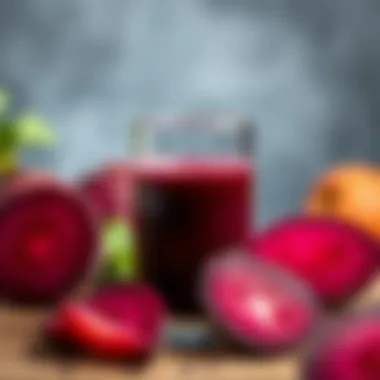Exploring Beet Juice's Role in Blood Pressure Management


Intro
The exploration of dietary interventions for health management has garnered increasing attention in recent years, particularly as more people seek natural solutions for common ailments. A notable contender in this arena is beet juice, which might not be on everyone's radar but is becoming increasingly popular, especially among those concerned with hypertension. The benefits of beet juice are primarily attributed to its rich nitrate content, which, as research suggests, can play a significant role in regulating blood pressure. This article aims to provide a comprehensive look at how beet juice consumption may aid in lowering blood pressure and offers insights into the underlying mechanisms that facilitate this phenomenon.
Article Overview
Purpose of the Article
The primary objective of this article is to delve into the relationship between beet juice and blood pressure regulation. By discussing the biochemical properties of beets, particularly their nitrates, and examining relevant studies, it seeks to equip the reader with an understanding of how beet juice can act as a natural remedy. Moreover, this discourse will not only clarify the interaction between these variables but also furnish readers with practical advice concerning the integration of beet juice into their diets—especially those grappling with hypertension.
Relevance to Multiple Disciplines
The investigation of beet juice's effects on blood pressure intersects various fields, including nutrition, biology, and medicine. Nutritional science benefits from understanding how dietary components affect health, while biology provides insights into the physiological processes involved in blood pressure regulation. Medical professionals may explore beet juice as a supportive strategy in their treatment plans for patients with hypertension. Each discipline contributes valuable perspectives towards a holistic understanding of health management through nutrition.
Research Background
Historical Context
The use of beets for health purposes stretches back centuries. Ancient civilizations recognized the nutritional value of beets, but only in more recent times has scientific research begun to uncover the specific health benefits linked to beet juice, particularly concerning cardiovascular health. With the rise in hypertension as a global health concern, interest in natural remedies like beet juice has surged, prompting a range of studies targeting its efficacy.
Key Concepts and Definitions
To fully appreciate the implications of beet juice consumption, certain terminology warrants clarification:
- Nitrates: Compounds found naturally in various vegetables, primarily beets. They convert to nitric oxide in the body, facilitating improved blood flow and potential blood pressure reduction.
- Blood Pressure: The force exerted by circulating blood against the walls of blood vessels. Elevated levels may lead to adverse health outcomes, necessitating management.
- Hypertension: A chronic condition characterized by consistently high blood pressure, often requiring lifestyle modifications and medical intervention.
Understanding these concepts lays the groundwork for comprehending how something as simple as beet juice can have far-reaching implications for heart health.
"Dietary strategies, such as the consumption of beet juice, may offer a sustainable approach to managing hypertension without the need for pharmaceuticals in some cases."
"Dietary strategies, such as the consumption of beet juice, may offer a sustainable approach to managing hypertension without the need for pharmaceuticals in some cases."
In the subsequent sections, the article will dissect the biochemical mechanisms that make beet juice a valuable ally in blood pressure management, highlighting important research as well as practical diet integration tips for those looking to take charge of their cardiovascular health.
Prelims to Beet Juice and Blood Pressure
The relationship between beet juice and blood pressure is a topic gaining traction in both medical circles and among health enthusiasts. As the prevalence of hypertension continues to rise globally, alternative remedies are sought after more than ever. This article explores how beet juice, a vibrant elixir derived from beets, may hold significant promise in managing blood pressure levels.
Blood pressure, often described in two figures—systolic and diastolic—is crucial for understanding heart health. High blood pressure, or hypertension, can lead to serious health complications such as heart disease and stroke. Exploring natural options like beet juice presents a fascinating avenue not only for patients but also for those keen on exploring holistic health strategies.
Understanding Blood Pressure
Blood pressure measures the force exerted by blood on the walls of blood vessels. This force is influenced by various factors including cardiac output and systemic vascular resistance. Two readings are common: the systolic pressure indicates the pressure during heartbeats, while diastolic pressure measures the pressure when the heart rests between beats.
- Systolic Pressure: The upper number in a reading (e.g., 120/80), indicating the pressure in arteries when the heart beats.
- Diastolic Pressure: The lower number, indicating the pressure in arteries when the heart is at rest.
Understanding these values is essential for identifying hypertension, which may go unnoticed without routine checks. Persistent high blood pressure can lead to serious conditions, thus emphasizing the importance of regular monitoring and management.
Beet Juice: Composition and Nutritional Value
Beet juice is not just a colorful beverage; it's rich in essential nutrients and compounds that may contribute to its health benefits. At the heart of beet juice's promise are its high levels of nitrates. These nitrates undergo conversion to nitrites by bacteria in the mouth and then to nitric oxide in the blood, which plays a key role in vascular function.
The primary components of beet juice include:
- Nitrates: Naturally occurring compounds that can enhance blood flow, contributing to lower blood pressure.
- Vitamins: Beet juice contains vitamin C, folate, and various B vitamins that support overall health.
- Minerals: Potassium and magnesium, essential for heart health and blood pressure regulation.
- Antioxidants: Such as betalains, known for their anti-inflammatory and antioxidant properties.
This unique composition underscores beet juice's potential as a beneficial addition to the diet of individuals managing blood pressure.
"Incorporating beet juice into your daily routine might just give your heart the support it needs to stay in tip-top shape."
"Incorporating beet juice into your daily routine might just give your heart the support it needs to stay in tip-top shape."


To delve deeper, one might explore various studies that investigate the extent of beet juice's effects on blood pressure, paving the way for a more holistic understanding of diet and health.
The Role of Nitrates in Beet Juice
Nitrates, found abundantly in beet juice, play a pivotal role in the discussion surrounding blood pressure regulation. They serve not only as a significant dietary component but also as a key player in the biochemical processes that govern vascular health. Understanding nitrates goes beyond their mere presence in food; it delves into their conversion and function within the human body. This section explores how these compounds set off a cascade of physiological benefits, particularly for those wrestling with hypertension.
Biochemical Pathways of Nitrate Metabolism
When beet juice is consumed, the nitrates it contains undergo a fascinating transformation. Initially, nitrates are ingested and then absorbed into the bloodstream, where they undergo reduction into nitrites. This reduction is facilitated by oral bacteria, which play an unexpected yet crucial role in nitrate metabolism. The nitrites can then be further converted into nitric oxide within the body. This conversion is not just a random sequence; it represents a series of biochemical pathways that are vital for cardiovascular functionality.
In a nutshell, here’s how it goes:
- Nitrate intake from beet juice enters the bloodstream.
- Conversion takes place in the mouth, aided by bacteria, turning nitrates into nitrites.
- Nitrites are then converted into nitric oxide in the acidic environment of the stomach or directly in the bloodstream.
Nitric oxide, a simple molecule with a profound impact, is the yardstick of healthy blood flow and pressure regulation. Without adequate conversion, the potential benefits of beet juice would be drastically diminished. Therefore, ensuring a healthy oral microbiome is as crucial as the consumption of the juice itself.
Nitric Oxide Production and Blood Vessel Function
The production of nitric oxide is where the rubber meets the road. Nitric oxide acts as a signaling molecule that plays an indispensable role in vascular health. It prompts vasodilation, which is the widening of blood vessels. This process is crucial for regulating blood pressure. In practical terms, when blood vessels widen, there is less resistance for the blood to flow through, effectively lowering blood pressure and easing the heart's workload.
Understanding this mechanism also helps illustrate why beet juice is gaining traction as a natural remedy for hypertension. Regular consumption could lead to enhanced vascular function, thus promoting overall cardiovascular health. Here are some key points regarding the relationship between nitric oxide production and blood vessel function:
- Improved Blood Flow: As nitric oxide promotes vasodilation, blood can flow more easily, reducing strain on the heart.
- Enhancement in Endothelial Function: The endothelium, the thin layer lining blood vessels, benefits from nitric oxide; its health is crucial for blood pressure regulation.
- Long-term Benefits: Consistent intake of nitric oxide precursors, like thosefrom beet juice, might lead to sustainable improvements in blood pressure over time.
The interconnectedness of nitrates, nitric oxide, and blood vessel function illustrates the complex nature of dietary impact on physiological health.
"Nitrates are not just food; they are the key to unlocking healthier blood pressure through nitric oxide production."
"Nitrates are not just food; they are the key to unlocking healthier blood pressure through nitric oxide production."
The implications of these biochemical processes underline the significance of beet juice—not merely as a food item but as a valued ally in blood pressure management strategies. The exploration of beet juice and its nitrate content thus becomes essential for both individuals seeking alternative health solutions and researchers delving deeper into cardiovascular health.
For further reading on the biochemical pathways of nitrates, you can visit Wikipedia or check Britannica for an overview of nitric oxide's role in the body.
Scientific Evidence: Beet Juice and Hypertension
Exploring the interplay between beet juice and hypertension carries significant weight in understanding natural remedies for high blood pressure. It becomes imperative to closely examine how beet juice, rich in nitrates, can offer insights into tangible health benefits. Moreover, investigating varied avenues through clinical trials and observational studies enhances our grasp on beet juice’s role in managing hypertension. The following sections delve into key studies and the contrasting methodologies employed in research, providing a solid foundation for future inquiries.
Key Studies and Findings
Numerous studies underline the potential implications of beet juice on blood pressure regulation. A noteworthy trial conducted by the American Heart Association examined the effects of beetroot supplementation on blood pressure among hypertensive individuals. In this randomized, double-blind, placebo-controlled study, participants who consumed beet juice showed a statistically significant reduction in both systolic and diastolic blood pressure over a four-week period when compared to the placebo group.
Another relevant study published in the journal Hypertension evaluated the impact of dietary nitrates on blood pressure and vascular function. Findings revealed that those who regularly consumed nitrate-rich foods, including beet juice, experienced greater improvements in vascular health and lower blood pressure levels. The consistent data across these studies indicate that beet juice consumption might indeed lead to favorable outcomes for people struggling with hypertension.
"The evidence suggests that even modest beet juice consumption can lead to measurable reductions in blood pressure, shedding light on a simple dietary approach to hypertension management."
"The evidence suggests that even modest beet juice consumption can lead to measurable reductions in blood pressure, shedding light on a simple dietary approach to hypertension management."
Study Designs: Clinical Trials vs. Observational Studies
Diving into the methodologies behind the research is crucial to grasping the validity and reliability of the findings. Clinical trials stand out for their rigor, typically featuring a controlled environment and the assignment of participants to either treatment or placebo groups. This design allows for clearer causal inferences about beet juice's effect on blood pressure.
In contrast, observational studies, such as cohort studies or case-control studies, collect data from a larger population without imposing any interventions. While these provide invaluable insights into real-world effectiveness and dietary habits over time, they may not always account for confounding variables, such as lifestyle factors or genetic predispositions.
Both study designs play a pivotal role in advancing knowledge in this domain:
- Clinical Trials:
- Observational Studies:
- Controlled environments provide higher reliability.
- Ensure well-defined parameters for measuring outcomes.
- Larger, diverse populations offer broader insights.
- Useful for examining long-term impacts of dietary patterns.


Through integrating findings from both types of studies, researchers can create a well-rounded picture that informs dietary recommendations for hypertensive patients based on robust scientific evidence.
Mechanisms Behind Blood Pressure Reduction
Understanding the mechanisms that drive blood pressure reduction is crucial when evaluating the role of beet juice in cardiovascular health. As we delve into the science, we discover how the components of beet juice interlink with biological pathways to support vascular health. The key players here are nitrates, which, when consumed, facilitate several physiological responses beneficial for individuals aiming to manage their blood pressure effectively.
One of the standout features of beet juice is its ability to promote vasodilation. This effect is particularly significant because it helps widen blood vessels, ultimately lowering systemic blood pressure. The primary reason behind this mechanism involves the conversion of dietary nitrates into nitric oxide in the body, a small but mighty molecule with notable relaxing properties for blood vessels.
Moreover, understanding how beet juice influences endothelial function is essential to grasp its impact on overall heart health. The endothelium acts as a barrier and regulator of vascular homeostasis. When beet juice enhances endothelial function, it not only facilitates vasodilation but also improves the response of blood vessels to various physiological stimuli.
These mechanisms can have meaningful health implications, particularly for individuals concerned about hypertension or other cardiovascular conditions. Given that high blood pressure often stems from issues related to vascular stiffness and impaired endothelial function, the potential of beet juice as a dietary intervention cannot be overstated. Its integration into daily diets could serve as a proactive measure to maintain optimal blood pressure levels and promote overall cardiovascular health.
Vasodilation Effects of Nitric Oxide
Vasodilation is a process that involves the relaxation of blood vessels, allowing them to widen and increase blood flow. The pivotal role of nitric oxide in this process cannot be overstated. When beet juice is ingested, its nitrates undergo conversion through a series of enzymatic actions to produce nitric oxide. The presence of nitric oxide in the bloodstream triggers the relaxation of smooth muscle cells within the vascular system.
This physiological response reduces vascular resistance, leading to decreased blood pressure. In practical terms, this means that the heart does not have to exert as much force to pump blood, ultimately offering a more efficient and healthier circulation. The vasodilatory effects can last for several hours after consuming beet juice, which is part of why some athletes utilize it to enhance performance.
Additionally, studies indicate that nitric oxide not only aids vasodilation but also plays a role in reducing inflammation and improving insulin sensitivity, contributing to a multi-faceted approach to vascular health.
Key Points on Vasodilation Effects:
- Consumption of beet juice increases nitric oxide levels in the bloodstream.
- Nitric oxide relaxes smooth muscles in blood vessels, leading to vasodilation.
- Improved blood flow reduces the energy required from the heart, promoting cardiovascular efficiency.
Impact on Endothelial Function
The endothelium, a single layer of cells lining the blood vessels, plays a vital role in maintaining vascular health. Healthy endothelial function is essential for regulating vascular tone and ensuring that blood vessels appropriately respond to various stimuli. Beet juice supports endothelial function primarily through the enhanced availability of nitric oxide.
When endothelial cells are functioning optimally, they can secrete substances that assist in maintaining balance within the vascular system. This includes the regulation of vasodilation, anti-inflammatory responses, and modulation of coagulation processes. Beet juice appears to positively influence these factors by promoting the release of nitric oxide, thereby contributing to endothelial health and resilience.
Moreover, enhanced endothelial function may help mitigate some of the harmful effects associated with chronic hypertension, such as arterial stiffness and increased cardiovascular risk.
Considerations Regarding Endothelial Function:
- Healthy endothelial function is linked to reduced cardiovascular disease risk.
- Beet juice's contribution to nitric oxide production helps maintain endothelial health.
- Improved endothelial response leads to better regulation of blood pressure and blood flow.
Overall, beet juice may offer a compelling avenue for supporting blood pressure control not just through mechanical means, like vasodilation, but also by fostering a healthier endothelial environment. This dual-action mechanism highlights the importance of dietary strategies in managing hypertension and promoting heart health.
Considering the roles of nitric oxide in vascular health opens up new pathways for research and practical applications in hypertension management.
Considering the roles of nitric oxide in vascular health opens up new pathways for research and practical applications in hypertension management.
Health Benefits Beyond Blood Pressure Control
Beet juice is often celebrated for its promising impact on blood pressure, but its advantages extend well beyond just regulation of this vital sign. Understanding these additional health benefits can empower individuals not only to improve cardiovascular health but also to enhance overall well-being. By exploring the multiple dimensions of beet juice, one can appreciate its role in supporting bodily functions and promoting vitality.
Antioxidant Properties of Beets
Beets are rich in antioxidants, which play a vital role in neutralizing harmful free radicals in the body. Free radicals can cause oxidative stress, leading to cellular damage and various chronic diseases. The potent antioxidants in beet juice include betalains, which are responsible for its deep red color. These compounds have been shown to exhibit anti-inflammatory and detoxifying properties.
Moreover, antioxidants are crucial in maintaining the body’s defense mechanism. Studies suggest that regular consumption of antioxidant-rich foods, such as beet juice, may lower the risk of chronic conditions like cancer and heart disease. Incorporating beet juice into your diet might be an effective way to up the ante on your nutritional intake.
"Antioxidants in beet juice not only combat oxidative stress but also enhance the body's resilience against diseases."
"Antioxidants in beet juice not only combat oxidative stress but also enhance the body's resilience against diseases."
Effects on Exercise Performance
Beet juice has garnered attention from athletes due to its potential to enhance exercise performance. The high concentration of nitrates in beet juice converts into nitric oxide in the body, which can contribute to improved blood flow and oxygen delivery to the muscles. This effect might delay fatigue and enhance endurance during physical activities.
Several studies have shown that athletes who consumed beet juice before exercise experienced improved performance outcomes. For instance, a study published in the Journal of Applied Physiology indicated that athletes taking beet juice were able to improve their time in endurance tasks notably. This could translate to better performance in various sports, from running to cycling.


In summary, whether you’re an athlete looking to push your limits or a regular person aiming to stay active, beet juice could serve as a supportive addition to your routine. By enhancing muscle efficiency and recovery, it offers a compelling blend of benefits that complement its role in blood pressure management.
Incorporating beet juice into the diet isn't simply about managing hypertension; it’s also about embracing a holistic approach to health that includes antioxidant support and enhanced physical capabilities.
Risks and Considerations
When discussing the benefits of beet juice in the context of blood pressure management, it becomes essential to consider the potential risks and side effects associated with its consumption. While the nutrient profile of beet juice is often praised for its ability to lower blood pressure due to high levels of nitrates, there are areas that require careful consideration for those who may want to integrate it into their daily regimen.
Potential Side Effects of Beet Juice
Beet juice, despite its many virtues, can bring about certain side effects that may not be suitable for everyone. Common side effects can include:
- Digestive Upset: Some individuals may experience stomach upset or diarrhea after consuming beet juice. This could be due to the high fiber content or the body's sensitivity to nitrates. Each individual's digestive system reacts differently, hence moderation is key.
- Beeturia: A less harmful, but noteworthy effect, is beeturia, where the urine may turn pink or red after consuming beet juice. This phenomenon is generally harmless but can be alarming if someone is unaware of its cause.
- Lower Blood Pressure: While lowering blood pressure is often a desired effect, it could become a concern for individuals who already have low blood pressure or those on medications to reduce hypertension. Monitoring blood pressure levels becomes essential after introducing beet juice into the diet.
- Allergic Reactions: Though rare, some people may have allergies to beets, leading to symptoms such as itching, rashes, or even more severe responses.
It’s prudent to start with small amounts when trying beet juice for the first time to assess tolerance and response.
"Listening to your body is crucial; if something doesn’t feel right, it probably isn’t."
"Listening to your body is crucial; if something doesn’t feel right, it probably isn’t."
Interference with Medications and Medical Conditions
For individuals taking medications or managing chronic conditions, beet juice may interfere with certain treatments. This is particularly relevant for:
- Antihypertensive Medications: Since beet juice can further lower blood pressure, combining it with prescribed medications such as beta-blockers or ACE inhibitors may lead to hypotension, resulting in symptoms like dizziness or fainting.
- Blood Thinners: Beet juice contains vitamin K, which plays a role in clotting. For individuals on anticoagulants like warfarin, the intake of beet juice should be monitored strictly to avoid potential conflicts affecting the efficacy of these medications.
- Kidney Conditions: Beets are high in oxalates, compounds that can contribute to kidney stone formation. Those with kidney issues should consult healthcare providers before introducing beet juice to their diets.
- Diabetes: While the fiber content can be beneficial, beet juice can also raise blood glucose levels due to its natural sugars. Monitoring is essential for individuals managing diabetes.
Overall, consulting a healthcare professional before making significant dietary changes, particularly with a drink as potent as beet juice, is highly advisable. This cautious approach ensures that the benefits do not overshadow any potential risks that might arise.
Practical Recommendations
Understanding how to safely incorporate beet juice into your diet can maximize its potential benefits for managing blood pressure. A practical approach ensures that individuals can enjoy the positive effects of beet juice while being mindful of their personal health needs.
Incorporating Beet Juice into Your Diet
When it comes to including beet juice in your regular meals, it’s worth considering a few simple yet effective strategies:
- Start Slow: If you’re new to beet juice, begin by introducing it in small servings, such as half a cup. This allows your body to adjust without overwhelming your system.
- Mix It Up: Combine beet juice with other juices or smoothies to improve flavor and diversify nutrients. For instance, blending beet juice with apple or celery juice could create a tastier blend while still providing benefits.
- Timing Matters: Consume beet juice about two to three hours before engaging in physical activity. This timing can enhance blood flow and help boost exercise performance due to its nitric oxide content.
- Experiment with Meals: Consider adding beet juice to salads or as a base for soups. Not only does it add color, but it also enriches meals with additional antioxidants.
Using beet juice as a dressing or marinade is also an effective method to enjoy its benefits without just drinking it.
Daily Intake Guidelines
Navigating beet juice consumption can be straightforward with a clear understanding of daily intake recommendations. To harness the advantages effectively, keep the following points in mind:
- Suggested Quantity: Aim for one to two cups of beet juice per day. This dosage aligns well with research that indicates blood pressure reduction without compromising overall health.
- Monitor Responses: Pay attention to how your body reacts after consumption. Some individuals may experience gastrointestinal discomfort. If this occurs, consider reducing the intake.
- Balance and Variety: It’s essential to maintain a balanced diet. Rather than relying solely on beet juice, integrate a variety of fruits and vegetables into your meals to ensure a full spectrum of nutrients.
- Consultation Recommended: If you’re on medication or have underlying health issues, consult with a healthcare professional to tailor the recommendation that best suits your condition.
Remember, beets are powerful, but they work best as part of a broader dietary strategy, not as a standalone remedy.
Remember, beets are powerful, but they work best as part of a broader dietary strategy, not as a standalone remedy.
In summary, incorporating beet juice safely into your diet can provide remarkable benefits for blood pressure management. Coupled with mindful consumption practices, it can be an enriching addition to an overall health-oriented lifestyle.
The End
The examination of beet juice's effects on blood pressure presents an intriguing perspective on natural remedies that could support hypertension management. As discussed throughout the article, beet juice, primarily due to its high nitrate content, has been shown to promote vasodilation and enhance nitric oxide production. This physiological mechanism underpins the potential for beet juice to aid in lowering blood pressure, aligning with an increasing interest in non-pharmacological approaches to health.
Summarizing the Findings
The exploration of key studies highlights notable findings that bolster the claim of beet juice's effectiveness. Clinical trials have demonstrated significant reductions in systolic and diastolic blood pressure among participants consuming beet juice regularly. For instance, one meta-analysis pointed out a mean reduction of approximately 4-5 mmHg in blood pressure after consistent intake. Moreover, observational studies have added weight to the argument, showing populations that incorporate high-nitrate foods into their diets experience lower instances of hypertension.
Additionally, the antioxidant properties of beet juice contribute favorably to cardiovascular health, offering layers of benefit beyond mere blood pressure reduction. By supporting endothelial function and protecting against oxidative stress, beet juice serves multiple roles, appealing to those who might hesitate to rely solely on conventional medications.
Future Directions in Research
Despite encouraging findings, more research is needed to untangle the complexity of dietary nitrates and their long-term impact on blood pressure. Future studies should focus on larger, multi-center trials that examine varying dosages of beet juice and its effects across different demographics. Investigating the interaction between beet juice and common antihypertensive medications could provide crucial insights for both patients and healthcare providers. Furthermore, understanding the optimal timing and method of consumption—whether as fresh juice or in smoothie blends—remains an area ripe for exploration.
As the scientific community continues to scrutinize dietary influences on cardiovascular health, beet juice could emerge as a cornerstone of integrative health strategies. With further evidence, it may gain acceptance as a standard recommendation alongside traditional treatment options, offering patients safe, natural alternatives. Indeed, the journey to understanding how foods impact our health is ongoing, and beet juice uniquely stands at the intersection of nutrition and medicine.



